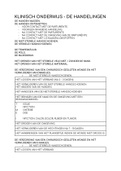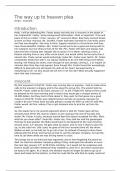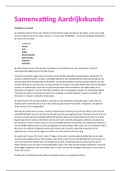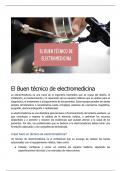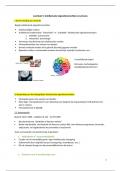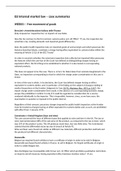Samenvatting sportpsychologie
Les 2. Motivatie
Motivatie: de reden dat iemand iets doet. ‘’Beweegreden, drijfveren, verklaring, de ‘waarom’’
- Intrinsieke motivatie: kost bijna geen moeite; je wilt het doen.
- Extrinsieke motivatie: beloning ervoor zoeken *studiepunten, geld, afvallen
Nature denkers denken dat je biologisch geboren bent met motivatie > je hebt het of je hebt het niet
Nurture denkers denken dat je omgeving het bepaald > je kunt het leren
Invloed op motivatie:
- Selfefficacy: zelfkennis en zelfvertrouwen.
- Autonomy: zelf keuzes kunnen maken of het gevoel dat je er zelf
voor gekozen hebt.
- Level of skill
- Level of challenge
Als level of skill en level of challenge in balans zijn zit je in het flow channel
en blijf je gemotiveerd. Is skill level hoger dan de challenge ontstaat er
boredom. Als challenge level hoger is dan skill level ontstaat er anxiety.
Les 3. Doelstellingen
Functie van doelstellingen is om de motivatie hoog te houden, om beter te worden of om
succeservaringen te behalen
- Resultaatdoel: winnen/niet laatste worden
- Prestatiedoel: op jezelf gericht *PR
- Procesdoel: zorgen dat je uiteindelijk je prestatie doel kan halen
Soorten doelstellingen:
- Taak/task georiënteerd: gericht op jezelf en jouw prestatie *PR, harder trainen
- Eigen/ego georiënteerd: gericht op jezelf en de sportprestaties van andere *eerste plek >
hierbij ben je dus afhankelijk van de prestatie (bijv een slechte dag) van de ander, waardoor
het minder betrouwbaar is
Achievement Goal Theory: ‘’er moet balans zijn tussen beide doelen’’
AGT heeft andere benamingen voor de doelstellingen:
- Task > mastery goals
- Ego > performance goals
, Les 4. Concentratie en herstel
Concentratie (vaak nodig in teamverband) = heb je altijd en is zeer vergankelijk en oppervlakkig.
Focus (vaak nodig bij individuele sporten) = heb je niet altijd en is minder vergankelijk en dieper.
Cirkels van invloed
Na de wedstrijd: Attributies
- Attributies zijn oorzaken waar je een bepaalde gebeurtenis aan toe schrijft. * ‘’we hebben
verloren door die slechte scheids’’ > heeft invloed op de volgende wedstrijd met die scheids.
- Als het een reden heeft (de prestatie) is het een funtionele attributie > positief. * ‘’Ik heb
verloren, omdat ik nog rustig aan moet doen met mijn blessurre.’’
- Attributies staan dus niet vast, maar je verteld het jezelf, daarom is het trainbaar.
Leren focussen:
Bewust worden van de gedachtes
Is het een functionele of een disfunctionele gedachte?
Fysiek herstel:
Les 2. Motivatie
Motivatie: de reden dat iemand iets doet. ‘’Beweegreden, drijfveren, verklaring, de ‘waarom’’
- Intrinsieke motivatie: kost bijna geen moeite; je wilt het doen.
- Extrinsieke motivatie: beloning ervoor zoeken *studiepunten, geld, afvallen
Nature denkers denken dat je biologisch geboren bent met motivatie > je hebt het of je hebt het niet
Nurture denkers denken dat je omgeving het bepaald > je kunt het leren
Invloed op motivatie:
- Selfefficacy: zelfkennis en zelfvertrouwen.
- Autonomy: zelf keuzes kunnen maken of het gevoel dat je er zelf
voor gekozen hebt.
- Level of skill
- Level of challenge
Als level of skill en level of challenge in balans zijn zit je in het flow channel
en blijf je gemotiveerd. Is skill level hoger dan de challenge ontstaat er
boredom. Als challenge level hoger is dan skill level ontstaat er anxiety.
Les 3. Doelstellingen
Functie van doelstellingen is om de motivatie hoog te houden, om beter te worden of om
succeservaringen te behalen
- Resultaatdoel: winnen/niet laatste worden
- Prestatiedoel: op jezelf gericht *PR
- Procesdoel: zorgen dat je uiteindelijk je prestatie doel kan halen
Soorten doelstellingen:
- Taak/task georiënteerd: gericht op jezelf en jouw prestatie *PR, harder trainen
- Eigen/ego georiënteerd: gericht op jezelf en de sportprestaties van andere *eerste plek >
hierbij ben je dus afhankelijk van de prestatie (bijv een slechte dag) van de ander, waardoor
het minder betrouwbaar is
Achievement Goal Theory: ‘’er moet balans zijn tussen beide doelen’’
AGT heeft andere benamingen voor de doelstellingen:
- Task > mastery goals
- Ego > performance goals
, Les 4. Concentratie en herstel
Concentratie (vaak nodig in teamverband) = heb je altijd en is zeer vergankelijk en oppervlakkig.
Focus (vaak nodig bij individuele sporten) = heb je niet altijd en is minder vergankelijk en dieper.
Cirkels van invloed
Na de wedstrijd: Attributies
- Attributies zijn oorzaken waar je een bepaalde gebeurtenis aan toe schrijft. * ‘’we hebben
verloren door die slechte scheids’’ > heeft invloed op de volgende wedstrijd met die scheids.
- Als het een reden heeft (de prestatie) is het een funtionele attributie > positief. * ‘’Ik heb
verloren, omdat ik nog rustig aan moet doen met mijn blessurre.’’
- Attributies staan dus niet vast, maar je verteld het jezelf, daarom is het trainbaar.
Leren focussen:
Bewust worden van de gedachtes
Is het een functionele of een disfunctionele gedachte?
Fysiek herstel:

